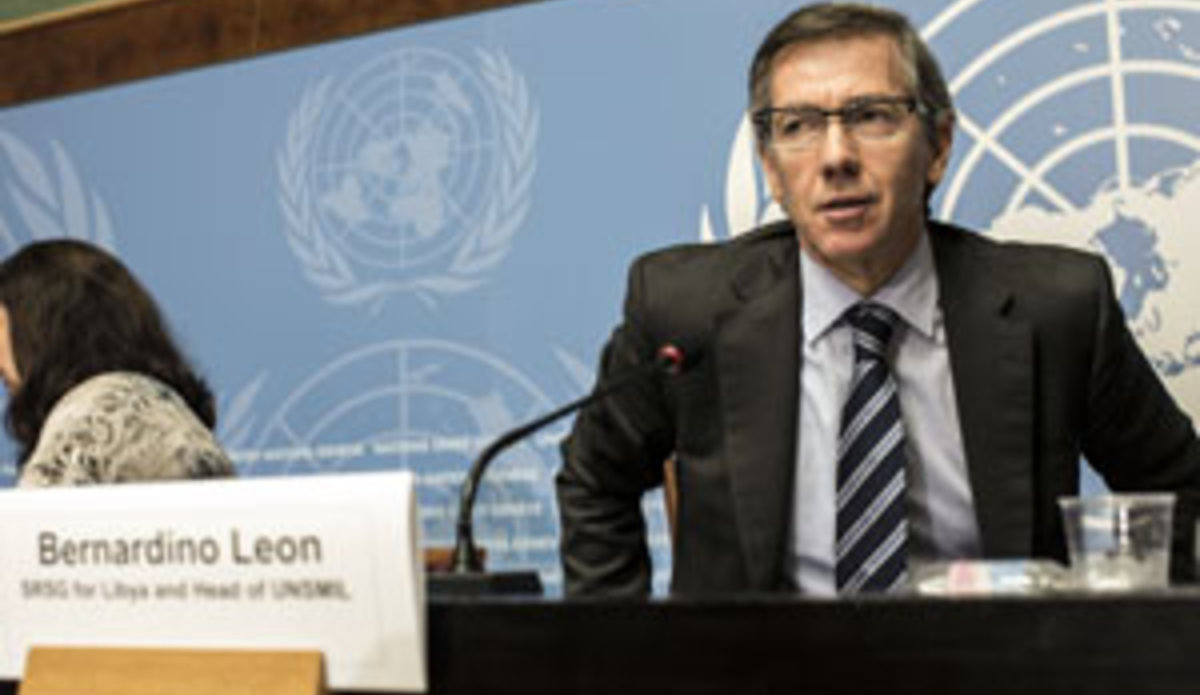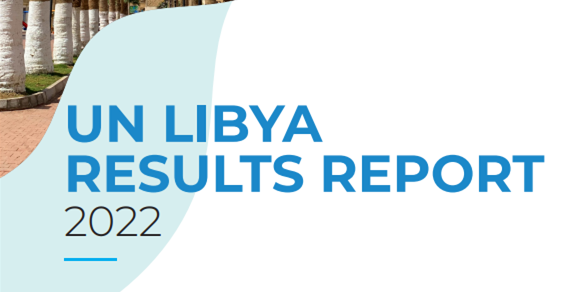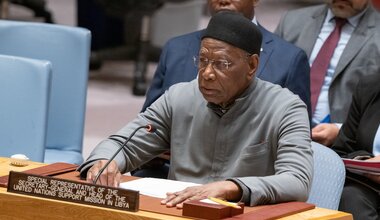Statement by SRSG for Libya Bernardino Leon to the Security Council as delivered on 18 February 2015
Mr. President, Distinguished Members of the Council, Excellencies
1. I am grateful for the opportunity to brief the Council today on the situation in Libya at this critical juncture.
2. Let me begin by expressing my condolences and sympathy to all the families of victims of terrorism and extremism in Libya.
3. I condemn in the strongest possible terms the horrific and brutal acts we have witnessed in Libya over the recent days and weeks. No words can express my outrage and revulsion at the beheading of 21 men including 20 Egyptian nationals who were targeted for no other reason than their religious belief and nationality.
4. The scale of this atrocity should not eclipse the barbarity of other acts committed by extremist groups, including Islamic State and Ansar al-Sharia. In November, three young activists were beheaded in Derna; towards the end of December, a young Egyptian doctor and his wife, also Copts, were brutally murdered at their home in Sirte; their daughter, who was abducted, was found dead on the city’s outskirts the next day.
5. These are but a few of the many countless incidents which every day affect thousands of civilians, who bear the brunt of war and displacement and are victims of serious violations of human rights and international humanitarian law, especially in areas like Benghazi.
6. The savage terrorist acts highlight once again the imminent danger confronting Libya, its people and the wider region unless there is a swift agreement among the main parties in the country on resolving the political crisis and bringing an end to the military and political conflict.
7. Since my last briefing to this Council, we have witnessed blatant disregard by Islamic State elements for Libya’s sovereignty and state institutions. The capture of public installations in Sirte and the attack last month on the Corinthia Hotel in Tripoli reflect a growing ability and determination on the part of Islamic State to exploit the political crisis and consequent security vacuum to consolidate its presence and influence across Libya.
8. Recent incidents, including the attacks on the oilfields in Mabruk and south of Sidra clearly demonstrate the increasing ability of IS and other terrorist groups to operate in different parts of the country, whether in Derna, Benghazi, Sirte or Sabratha.
9. Extremist groups with radical ideologies, associated with Al Qaeda have been on the rise since the end of the armed conflict in 2011, with Ansar al-Sharia’s strongholds in Benghazi and Derna already constituting a serious terrorist challenge in the context of the Libyan crisis. These have served as platforms for mobilizing support for Islamic State.
Mr. President, Members of the Council,
10. Islamic State has already shown its potential of destruction in Iraq and Syria. Operating across borders, it has mobilized recruits and significant financial resources, including through the use of social media. In Libya, IS has found fertile ground in the growing post-revolution political instability, capitalizing also on the weakness of state institutions and state security sector. The steady influx of foreign nationals has bolstered its ranks and now threatens to introduce yet another dimension to the conflict in Libya.
11. We should be gravely concerned by this turn of events and firmly oppose the ideology and terrorist practices of the Islamic State. These radical forces must be confronted at every turn. No strategy will be successful without strong regional cooperation and an empowered Libyan State and authorities.
12. We must not lose sight of the complexities of the Libya’s crisis; of its weak and fragmented state institutions, their current political polarization; the predominance of armed groups seemingly oblivious to the national interest; media incitement and inflammatory rhetoric and corruption. These are all factors that have contributed to the current break down of basic state functions, the disruption of the country’s economy and of its social fabric.
Mr. President, Members of the Council,
13. Since my last briefing to this Council, we have made considerable headway in bringing the main parties to the negotiating table. We have progressively structured a political dialogue along five mutually reinforcing tracks, bringing together representatives from a broad spectrum of the Libyan political, military and social landscape.
14. The objective of the dialogue is to bring Libya out of the chaos that is providing terrorism with the fertile ground for it to breed further violence and destruction.
15. In January, the United Nations hosted two rounds of political talks in Geneva in which discussions were focused on reaching agreement on a national unity government and security arrangements to include also a comprehensive ceasefire.
16. Within Libya, reactions to the talks have been overwhelmingly positive and appear to have injected a new ray of hope regarding the possibility of a peaceful resolution of the political crisis and military conflict. Notwithstanding the hardline positions initially adopted by some of the parties, the fact that all the major stakeholders now recognize the gravity of the situation and the need for a political resolution is, and must be seen, as a positive sign.
17. On this note, I am pleased to report that a week ago, I was in Ghadames where for the first time all the parties joined the UN-facilitated political dialogue. No doubt this marks an important breakthrough towards an inclusive political agreement, which remains the only avenue for a sustainable way out of the crisis.
18. I am hopeful that a political agreement can be reached soon; the differences among the parties are not insurmountable and I am confident that their sense of responsibility for the fate of the Libyan people and national unity, democracy and territorial integrity of the Libyan State will prevail over their differences. Yesterday, it was the anniversary of a revolution intended to realize these values, which look so far away today.9
19. We are also making progress, slow but steady, in trying to de-escalate the situation on the military front. These efforts have intensified following a string of attacks in the oil crescent region towards the end of December, and barring the attack by Islamic State elements in the Mabruk oilfield on 3 February, there has been a relative truce in hostilities.
20. Nonetheless, the overall situation remains fragile and there is much work to be done. The overall situation in Benghazi remains dire, and only yesterday we received reports of aerial attacks on Zintan in the west.
Mr. President, Members of the Council
21. The images of the brutal acts of terror, which we have witnessed in Libya in the recent months, have shaken our collective conscience. We must capitalize on this sense of urgency and – today more than ever – we must stand firmly behind the political process.
22. Given the sense of urgency, I have called for the next meeting of the political dialogue to finalise discussions initiated in Geneva on the formation of government of national unity and security arrangements to pave the way for a formal and comprehensive cessation of hostilities.
23. Defeating terrorism in Libya can only be achieved through the political and institutional determination of a united Libyan government, which will need the strong and unequivocal support from the international community in confronting the myriad challenges facing Libya. First and foremost, this will require the development of a coherent and comprehensive strategy to combat terrorism, as well as identifying the needs and support required from the international community.
Mr. President, Members of the Council
24. It is our shared responsibility to build consensus among the Libyan counterparts. It is crucial for the international community as a whole to maintain a unity of purpose, through coherent messaging and actions. Our efforts to counter terrorism in a sustainable manner cannot be a series of isolated acts and we should not allow terrorism to disrupt the political dialogue.
25. Allow me to use this opportunity to remind all parties that nothing in their actions or decisions at this critical time should be allowed to provide space or the opportunity for terrorist groups to further consolidate their presence or influence. I urge them to intensify their engagement towards a political resolution of the crisis. The window of opportunity is rapidly closing and no effort must be spared.
26. It is only through a strong government of national unity based on a solid consensus that Libyans, with the support of the international community, can aspire to be put in place an effective strategy to combat the growing threat posed by terrorist groups such as Islamic State.
27. I would like to thank all the governments in the region and international actors for their support to the United Nations efforts. I also would like to call on all Member States to spare no efforts in support of a political resolution of the Libyan crisis.
28. Finally, I take this opportunity to reiterate the commitment of the United Nations to Libya’s democratic transition, and that our engagement in Libya will continue to be guided by our utmost respect for Libya’s sovereignty, national unity and territorial integrity.
Thank you Mr. President.
 United Nations Peacekeeping
United Nations Peacekeeping UN
UN








